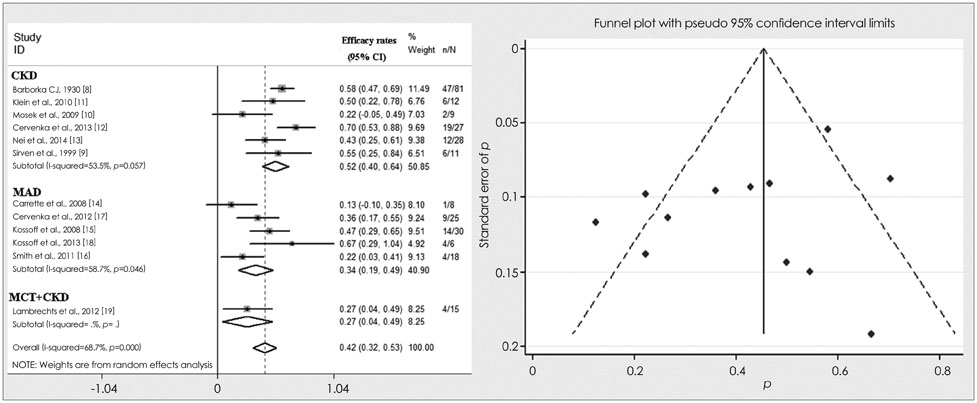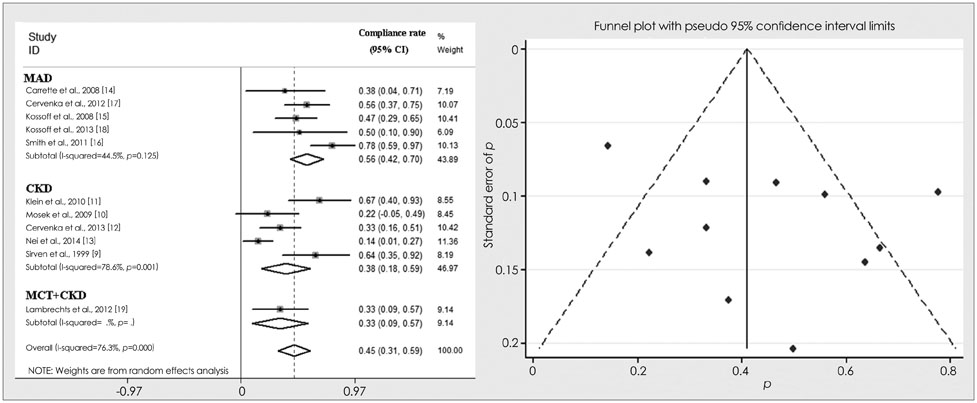J Clin Neurol.
2015 Jan;11(1):26-31. 10.3988/jcn.2015.11.1.26.
Efficacy of and Patient Compliance with a Ketogenic Diet in Adults with Intractable Epilepsy: A Meta-Analysis
- Affiliations
-
- 1Department of Neurology, Sichuan Provincial Academy of Medical Sciences & Sichuan Provincial People's Hospital, Chengdu, China. hongbinsun1@163.com, 18981838631@126.com
- KMID: 2179569
- DOI: http://doi.org/10.3988/jcn.2015.11.1.26
Abstract
- BACKGROUND AND PURPOSE
Despite the successful use of a ketogenic diet in pediatric epilepsy, its application in adults has been limited. The aim of this meta-analysis was to summarize the findings of relevant published studies in order to identify the efficacy of and compliance with a ketogenic diet and its main subtypes (i.e., classic ketogenic diet and modified Atkins diet) in adults with intractable epilepsy, and to provide useful information for clinical practice.
METHODS
Electronic searches of PubMed, EMBASE, Google Scholar, and the ISI Web of Science were conducted to identify studies of the efficacy of and patient compliance with a ketogenic diet in adults with intractable epilepsy; the included studies were reviewed. Meta-analyses were performed using STATA to determine combined efficacy rates and combined rates of compliance with the ketogenic diet and its main subtypes.
RESULTS
In total, 12 studies qualified for inclusion, and data from 270 patients were evaluated.The results of the meta-analysis revealed combined efficacy rates of all types of ketogenic diet, a classical ketogenic diet, and a modified Atkins diet were 42%, 52%, and 34%, respectively; the corresponding combined compliance rates were 45%, 38%, and 56%.
CONCLUSIONS
The results indicate that a ketogenic diet is a promising complementary therapy in adult intractable epilepsy, and that while a classical ketogenic diet may be more effective, adult patients are likely to be less compliant with it than with a modified Atkins diet.
Keyword
MeSH Terms
Figure
Cited by 2 articles
-
Status Epilepticus and Beyond: A Clinical Review of Status Epilepticus and an Update on Current Management Strategies in Super-refractory Status Epilepticus
Roy Poblete, Gene Sung
Korean J Crit Care Med. 2017;32(2):89-105. doi: 10.4266/kjccm.2017.00252.Ketone ester supplementation of Atkins-type diet prolongs survival in an orthotopic xenograft model of glioblastoma
Hassan Azari, Angela Poff, Dominic D’Agostino, Brent Reynolds
Anat Cell Biol. 2024;57(1):97-104. doi: 10.5115/acb.23.158.
Reference
-
1. Wilder RM. The effects of ketonemia on the course of epilepsy. Mayo Clin Bull. 1921; 2:307–308.2. Cervenka MC, Kossoff EH. Dietary treatment of intractable epilepsy. Continuum (Minneap Minn). 2013; 19(3 Epilepsy):756–766.
Article3. Kossoff EH, McGrogan JR, Bluml RM, Pillas DJ, Rubenstein JE, Vining EP. A modified Atkins diet is effective for the treatment of intractable pediatric epilepsy. Epilepsia. 2006; 47:421–424.
Article4. Kossoff EH, Hartman AL. Ketogenic diets: new advances for metabolism-based therapies. Curr Opin Neurol. 2012; 25:173–178.5. Kossoff EH, Cervenka MC, Henry BJ, Haney CA, Turner Z. A decade of the modified Atkins diet (2003-2013): Results, insights, and future directions. Epilepsy Behav. 2013; 29:437–442.
Article6. Lee PR, Kossoff EH. Dietary treatments for epilepsy: management guidelines for the general practitioner. Epilepsy Behav. 2011; 21:115–121.
Article7. Kwan P, Schachter SC, Brodie MJ. Drug-resistant epilepsy. N Engl J Med. 2011; 365:919–926.
Article8. Barborka CJ. Epilepsy in adults: results of treatment by ketogenic diet in one hundred cases. Arch Neurol Psychiatry. 1930; 23:904–914.9. Sirven J, Whedon B, Caplan D, Liporace J, Glosser D, O'Dwyer J, et al. The ketogenic diet for intractable epilepsy in adults: preliminary results. Epilepsia. 1999; 40:1721–1726.
Article10. Mosek A, Natour H, Neufeld MY, Shiff Y, Vaisman N. Ketogenic diet treatment in adults with refractory epilepsy: a prospective pilot study. Seizure. 2009; 18:30–33.
Article11. Klein P, Janousek J, Barber A, Weissberger R. Ketogenic diet treatment in adults with refractory epilepsy. Epilepsy Behav. 2010; 19:575–579.
Article12. Cervenka MC, Henry B, Nathan J, Wood S, Volek JS. Worldwide dietary therapies for adults with epilepsy and other disorders. J Child Neurol. 2013; 28:1034–1040.
Article13. Nei M, Ngo L, Sirven JI, Sperling MR. Ketogenic diet in adolescents and adults with epilepsy. Seizure. 2014; 23:439–442.
Article14. Carrette E, Vonck K, de Herdt V, Dewaele I, Raedt R, Goossens L, et al. A pilot trial with modified Atkins' diet in adult patients with refractory epilepsy. Clin Neurol Neurosurg. 2008; 110:797–803.
Article15. Kossoff EH, Rowley H, Sinha SR, Vining EP. A prospective study of the modified Atkins diet for intractable epilepsy in adults. Epilepsia. 2008; 49:316–319.
Article16. Smith M, Politzer N, Macgarvie D, McAndrews MP, Del Campo M. Efficacy and tolerability of the modified Atkins diet in adults with pharmacoresistant epilepsy: a prospective observational study. Epilepsia. 2011; 52:775–780.
Article17. Cervenka MC, Terao NN, Bosarge JL, Henry BJ, Klees AA, Morrison PF, et al. E-mail management of the modified Atkins Diet for adults with epilepsy is feasible and effective. Epilepsia. 2012; 53:728–732.
Article18. Kossoff EH, Henry BJ, Cervenka MC. Efficacy of dietary therapy for juvenile myoclonic epilepsy. Epilepsy Behav. 2013; 26:162–164.
Article19. Lambrechts DA, Wielders LH, Aldenkamp AP, Kessels FG, de Kinderen RJ, Majoie MJ. The ketogenic diet as a treatment option in adults with chronic refractory epilepsy: efficacy and tolerability in clinical practice. Epilepsy Behav. 2012; 23:310–314.
Article20. Payne NE, Cross JH, Sander JW, Sisodiya SM. The ketogenic and related diets in adolescents and adults--a review. Epilepsia. 2011; 52:1941–1948.
Article21. Miranda MJ, Mortensen M, Povlsen JH, Nielsen H, Beniczky S. Danish study of a modified Atkins diet for medically intractable epilepsy in children: can we achieve the same results as with the classical ketogenic diet? Seizure. 2011; 20:151–155.
Article22. El-Rashidy OF, Nassar MF, Abdel-Hamid IA, Shatla RH, Abdel-Hamid MH, Gabr SS, et al. Modified Atkins diet vs classic ketogenic formula in intractable epilepsy. Acta Neurol Scand. 2013; 128:402–408.
Article23. Kossoff EH, Bosarge JL, Miranda MJ, Wiemer-Kruel A, Kang HC, Kim HD. Will seizure control improve by switching from the modified Atkins diet to the traditional ketogenic diet? Epilepsia. 2010; 51:2496–2499.
Article24. Auvin S. Should we routinely use modified Atkins diet instead of regular ketogenic diet to treat children with epilepsy? Seizure. 2012; 21:237–240.
Article
- Full Text Links
- Actions
-
Cited
- CITED
-
- Close
- Share
- Similar articles
-
- Ketogenic Diet for Intractable Epilepsy in Infancy and Childhood: Anti-epileptic Efficacy and Tolerability
- Two Cases of Renal Stone Associated with Ketogenic Diet
- Epilepsy : Other Supplementary Treatments
- The use of ketogenic diet in special situations: expanding use in intractable epilepsy and other neurologic disorders
- The efficacy of ketogenic diet in childhood intractable epilepsy with malformation of cortical development




